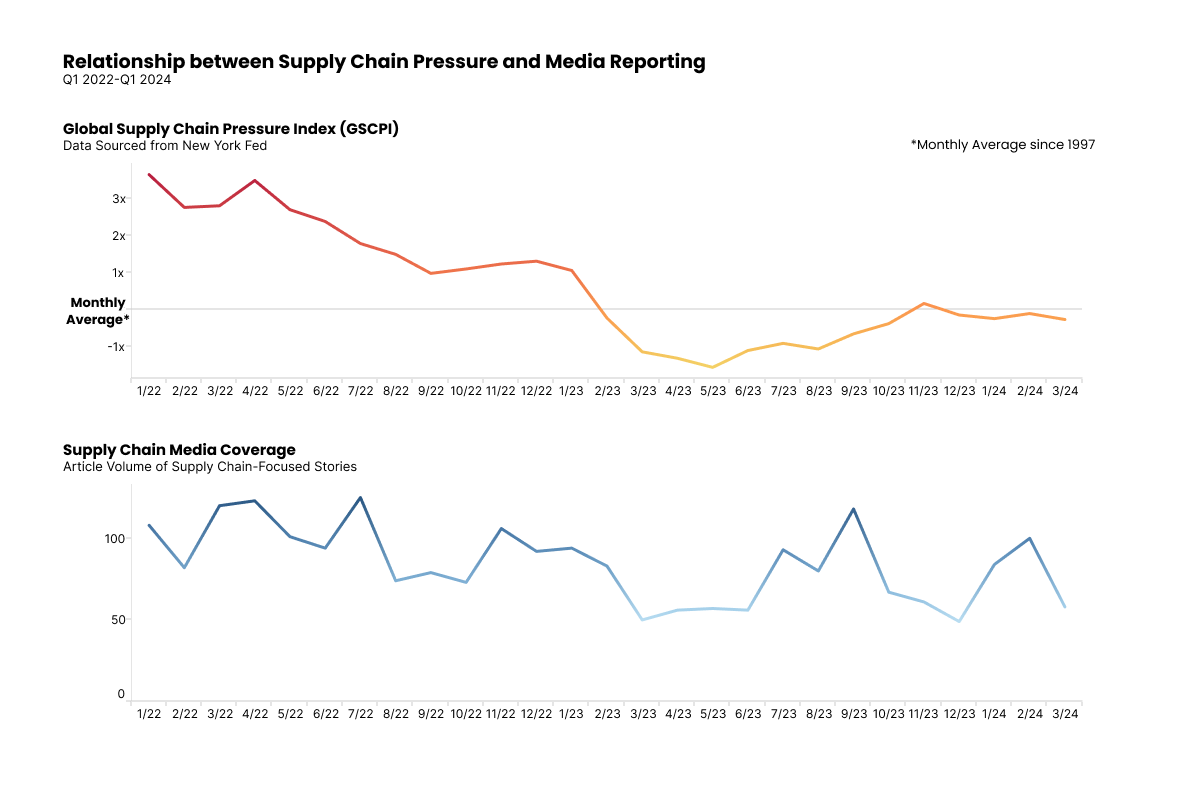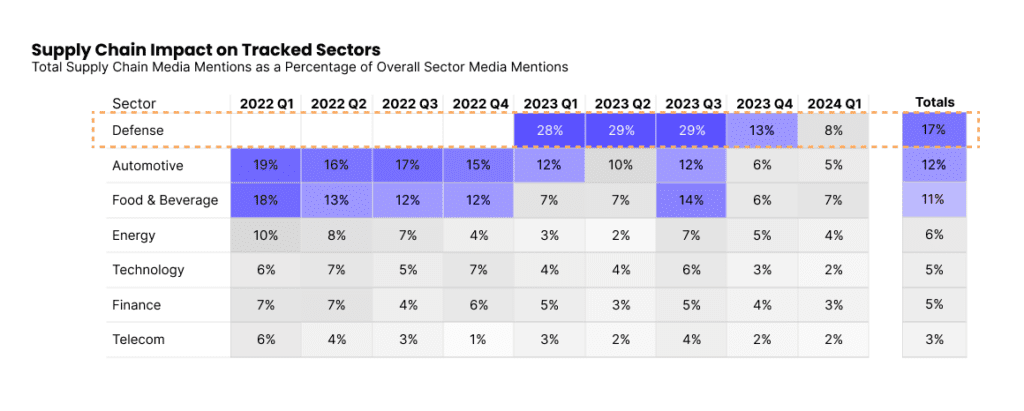
Defense Sector Reputation Risks
The pandemic had substantial negative effects on the global supply chain. With the world still doing its best to adjust to post-pandemic realities, the media remains sensitive to supply chain disruptions. Despite data suggesting that supply chain pressures have eased, news stories continue to frame supply chains as fragile, leaving industries like defense vulnerable to intense media scrutiny.
According to the Global Supply Chain Pressure Index (GSCPI), supply chain pressures have generally trended below the historical average for over a year. Yet media coverage on supply chain disruptions surged by over 100% in Q3 of 2023, reaching pandemic-era levels. This rise in coverage, despite relatively stable conditions, reveals how deep-rooted fears of supply chain instability persist, largely fueled by memories of pandemic-related disruptions.
For the defense sector, these shocks carry an even greater reputational risk. Defense is uniquely challenged by the geopolitical landscape, where global conflicts create unpredictable spikes in demand.

Global Conflicts and Outsized Demand
Throughout 2023, the defense industry faced heightened scrutiny, as supply chain issues featured prominently in nearly one-third of all defense-related media coverage. The nature of defense manufacturing—complex, highly regulated, and dependent on specialized suppliers—exposes the industry to gaps in its supply chain more visibly than in other sectors. Unlike consumer goods, where shortages might result in delayed shipments or backorders, a lapse in the defense supply chain can have far-reaching consequences that could lead to national security risks or international diplomatic repercussions.
With ongoing global conflicts driving outsized demand for items like military aircraft, technology, and more, the defense industry finds itself facing immense pressure to deliver quickly and efficiently. This demand exacerbates any existing vulnerabilities in the supply chain, from sourcing raw materials to securing manufacturing components. Any perceived or actual delays in fulfilling contracts can lead to negative media coverage. This further compounds the pressure on defense firms.

The Media’s Role in Amplifying Concerns
Even though supply chain pressures have been trending below the historical average, the media remains hyper-aware of any disruptions. Coverage tends to spike in response to real or perceived supply shocks, and the defense sector is no exception. For example, when a Boeing 737 Max panel blew out mid-flight, it triggered accusations of unrealistic production standards.
Journalists and analysts, still influenced by the pandemic, are quick to draw parallels between today’s challenges and the more severe disruptions of recent years. In fact, one-third of supply chain stories published since June 2023 (from CNN to Bloomberg to NPR) referenced the pandemic, demonstrating how much the media narrative is still shaped by past crises.
For defense communicators, this presents a significant challenge. Even when supply chain disruptions are minimal, heightened media sensitivity means that any hiccup can quickly become a headline.
The Impact on Defense Sector Reputation
Supply chain shocks are not just operational challenges for defense firms—they are reputational threats. The ability to quickly and reliably deliver products is critical to a company’s standing with stakeholders, including government clients, partners, and the general public. Delays in production or missed deadlines can lead to questions about the company’s efficiency and reliability.
The stakes are high. A damaged reputation in the defense sector can have long-term consequences, from losing critical government contracts to eroding public trust. Defense companies need to communicate effectively during times of supply chain stress, reassuring stakeholders that they are capable of managing disruptions while fulfilling their obligations.
Preparing for the Next Disruption
For PR and communications leaders in the defense sector, the key takeaway is clear: be prepared to respond quickly and strategically to any coverage of supply chain shocks. While current supply chain pressures may be near historical averages, media narratives are often shaped by past disruptions, making it crucial to anticipate how global conflicts or sudden demand spikes could reignite concerns.
PR teams must continuously monitor the media landscape, tracking coverage of supply chain issues and being ready to provide stakeholders with reassurances about the company’s operational capabilities. By staying ahead of the narrative, communicators can protect their brand from undue criticism and ensure that their organization maintains a strong reputation even in times of crisis.
Communicating the ability to meet demands, even in the face of unpredictable global pressures, will be critical to preserving trust and confidence in the defense industry as a whole. As supply chain shocks continue to make headlines, the defense sector must remain vigilant, ensuring that its reputation is as resilient as its supply chain.
Contact us here to learn how PublicRelay can support.